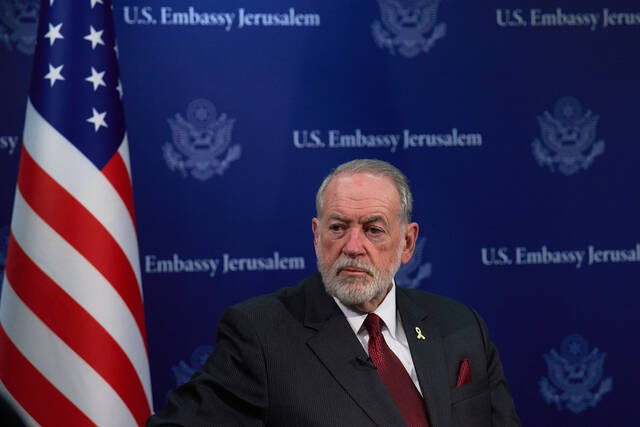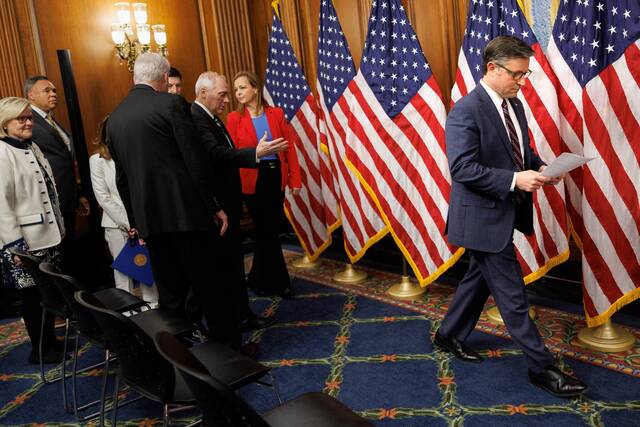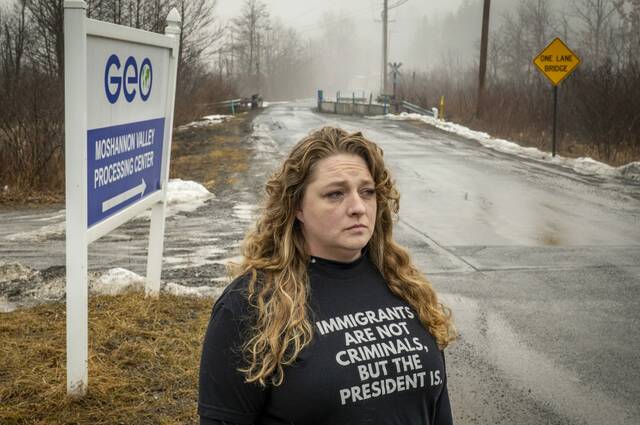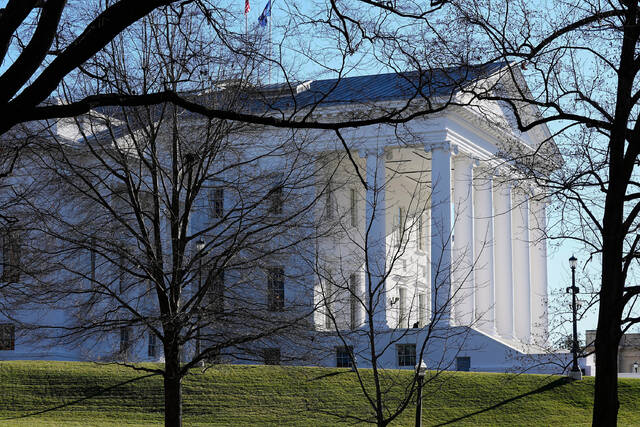Ben Wren parked himself Tuesday night in the back of Cupka’s Cafe II on the South Side, the “war station” of Allegheny County District Attorney Stephen A. Zappala’s reelection effort.
Politicians, supporters and reporters flowed like koi past Wren’s table. He constantly checked information on two tablets and a laptop. And at his elbow throughout the night sat the campaign manager’s key generals, joined in what some might view as an unholy coalition: Zappala himself, a lifelong registered Democrat running on the Republican ticket, and Tom Corbett, a former Republican governor of Pennsylvania.
Just after 10 p.m., Wren checked the latest election results.
“Hey, Steve!” the campaign manager shouted. “You just took the lead, buddy!”
Cheers and applause thundered forth. Thirty minutes later, it was all over. Zappala had beaten Matt Dugan, his progressive challenger, in a rematch from the primary, thanks to a potent combination of name recognition, high voter turnout and vicious negative ads.
There was one more thing that propelled Zappala to a seventh term: an alliance that united top Republican political consultants, Democratic power brokers and all stripes of businessmen, politicians and consultants bent on one thing: stopping Dugan, the county’s former chief public defender, and his progressive agenda.
“I’ve never seen anything like it,” Corbett marveled Wednesday.
During his victory speech, Zappala saved Wren to thank last after praising a long list of family members and supporters, including Democratic county Treasurer John Weinstein and powerful Republican legislators Kim Ward of Hempfield and Joe Pittman of Indiana. These were the unusual political bedfellows who had joined together to give the incumbent a margin of victory of more than 3 percentage points.
Wren, 38, of Greensburg, ran Zappala’s campaign as an associate with the Republican political consultant firm Long Nyquist & Associates. Zappala said he never even met the firm’s principal, Todd Nyquist, until four months ago after losing to Dugan in the primary.
Zappala had been unprepared, Wren and Corbett said. In most past elections, the district attorney had no opponent. In 2019, Zappala handily defeated his first challengers in decades without breaking much of a sweat.
Dugan, though, was a dangerous foe, bolstered by hundreds of thousands of dollars of contributions from liberal billionaire George Soros’ political action committee, which has funded the campaigns of progressive prosecutor candidates across the country.
“Soros came in at the end and spent $750,000, and Steve didn’t have time to really gear up and run a full-throated campaign,” Wren said. “He felt he got surprised in the primary.”
In the wake of the May primary, the county’s Republican chairman, Sam DeMarco, reached out to Corbett, suggesting that Zappala could be the GOP nominee in November. Both men were concerned about Dugan as DA.
Corbett penned a letter that was circulated to Republican committee members. They needed 500 signatures to get Zappala on the ballot; they got 10,000. The result gave them an important piece of data: Republicans would turn out for Zappala.
The next step was to figure out who should run the campaign. Businessman John Verbanac played matchmaker and in late July or early August suggested Long Nyquist, Wren said.
“It was kind of an unprecedented situation,” Wren said. “You have a 25-year Democratic office holder now running on the Republican ticket. Will Democrats stick with him? Will Republicans accept him? There were a lot of question marks.”
Before committing to a campaign, Long Nyquist commissioned a poll of 400 likely voters. The results gave them hope that Zappala could win.
“We didn’t know what to expect. None of us had been involved in a race like that,” Wren said. “We saw a path forward.”
With Corbett enlisted as a mentor, the former governor and state attorney general coached Zappala on something he had not had to do for 20 years: campaigning. He attended fundraisers and parades, spent hours in mock debates and town halls with Wren playing the role of Dugan, and hit people up for contributions.
“One of the knocks on him was people didn’t see him before. … Steve had a reputation to overcome that he wouldn’t work hard for it. Because he didn’t have to work hard,” Corbett said. “Now he’s invested because people are invested in him. He can’t let them down.”
As Zappala crammed for the race’s single televised debate, the campaign brought in a heavy hitter, Republican consulting firm Brabender Cox. The firm helped engineer three TV ads that Wren said were crucial to Zappala’s victory.
The campaign borrowed from the Republican playbook to put fear in the minds of would-be voters. Dugan campaign adviser Rick Grejda characterized the ads as “fire and brimstone,” meant to scare the electorate.
One ad warned that with Dugan as DA, crime would run rampant as it has in many parts of Philadelphia and San Francisco, two cities Republicans believe have been ruined by progressive prosecutors.
Another ad claimed that Dugan told victims of violent rapes to “shut up,” which he categorically denied. The third ad focused on a sign on a lawyer’s desk in the public defender’s office that criticized police with a profanity.
The Zappala campaign saw itself as selling a story to voters.
“We had that arc. We knew that our goal had to be to make Matt Dugan an unacceptable option to fight crime,” Wren said. “The way we do that is we say he’s going to turn us into Philadelphia … Second Act: He’s not going to stand up for victims. Third Act: He’s created this environment in his office where somebody puts up an ‘F the police’ sign.”
Grejda suspects that some voters were likely confused by Zappala being on the Republican ticket.
“There’s no doubt Steve Zappala identifies as a lifelong Democrat,” he said.
As the election neared, Grejda said, Dugan’s camp was predicting voter turnout of 35%. None of their models projected turnout as high as 41%, the percentage that voted Tuesday.
“The high-profile county executive race activated an increased number of voters and irregular voters that may not have been reflective of our polling,” he said.
One possible disadvantage for Dugan, according to Grejda, was the timing of his advertising campaign.
“The Zappala campaign came out on television earlier in the race than we anticipated, and based on the outcome, I wonder if we ever caught up” he said.
Dugan’s campaign did a good job with its ads throughout the summer to increase his name recognition and make up a considerable deficit in polling, Grejda said. But moving into the general election, it fell short.
Sam Hens-Greco, the county’s Democratic chairman, praised Dugan’s “ground game” — the door-knocking and showing up at events. But all that couldn’t beat back the affinity that some Democrats had for the Zappala name, he said.
“I think it was really the headwinds of running against somebody who had tremendous name recognition,” said Hens-Greco, who called the factors lining up against Dugan a “perfect storm.”
“We could have done something different, something better,” Hens-Greco said. “What would that have been? I’m not sure.”
Paula Reed Ward and Jonathan D. Silver are Tribune-Review staff writers. You can contact Paula at pward@triblive.com and Jonathan at jsilver@triblive.com.








